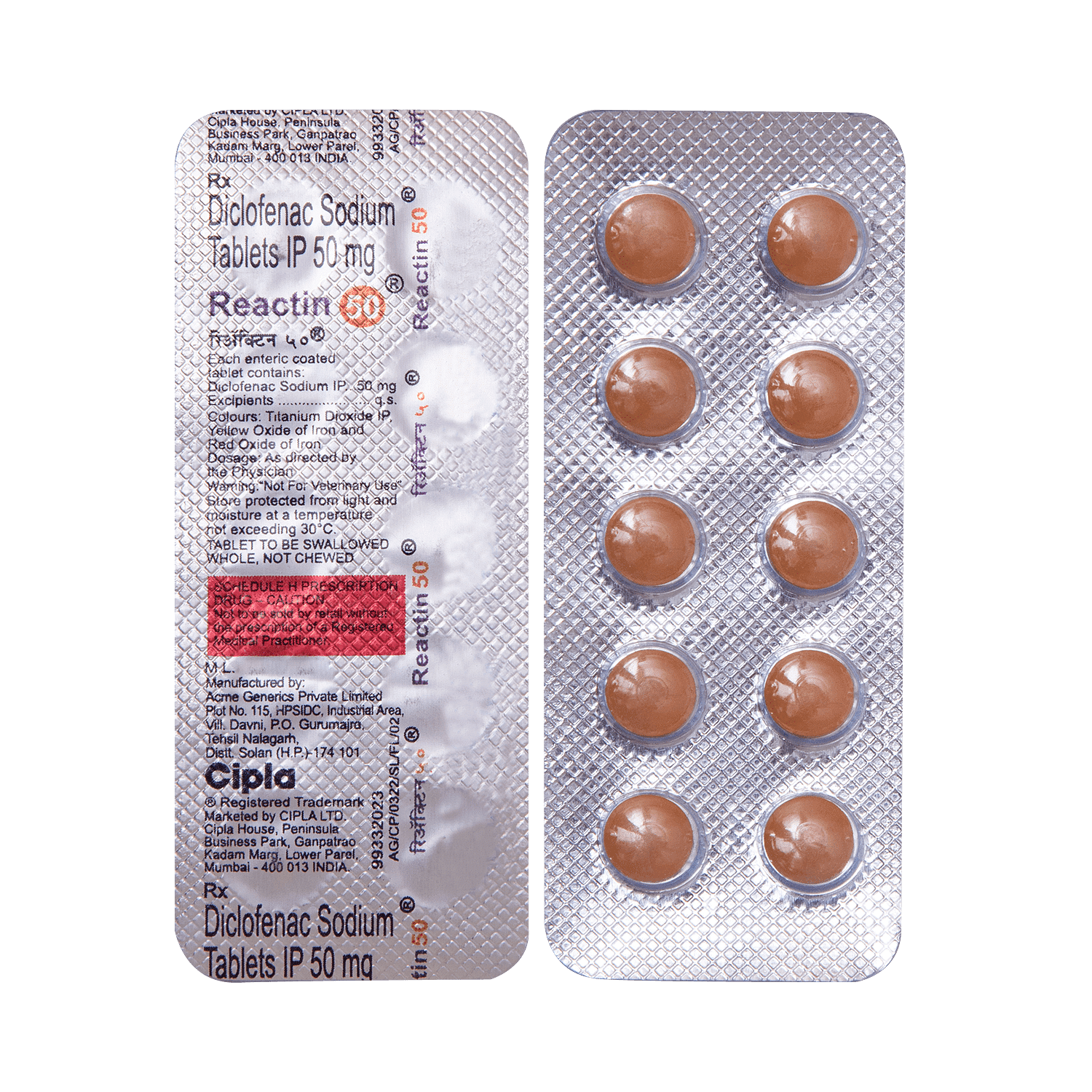
Diclogin 50mg Tablet
Manufacturer
Acron Pharmaceuticals
Salt Composition
Diclofenac (50mg)
Key Information
Short Description
Diclogin 50mg Tablet is a pain-relieving medicine used to treat pain, swelling, stiffness, and joint pain in conditions like rheumatoid arthritis, osteoarthritis, and acute musculoskeletal injuries.
Dosage Form
Tablet
Introduction
Diclogin 50mg Tablet is a non-steroidal anti-inflammatory drug (NSAID) used to relieve pain and inflammation in various conditions such as rheumatoid arthritis, osteoarthritis, and acute musculoskeletal injuries. It is commonly used for back pain, shoulder pain, neck pain, sprains, and spasms. While effective in managing pain, long-term use may lead to serious complications such as stomach bleeding and kidney problems. It is important to take this medication as prescribed by a doctor and to be aware of potential side effects such as dizziness, drowsiness, and visual disturbances. Patients with a history of heart disease or stroke should inform their doctor before using this medication.
Directions for Use
Take this medicine in the dose and duration as advised by your doctor. Swallow it as a whole. Do not chew, crush, or break it. Diclogin 50mg Tablet is to be taken with food.
How it works
Diclogin 50mg Tablet is a non-steroidal anti-inflammatory drug (NSAID). It works by blocking the release of certain chemical messengers that cause pain and inflammation (redness and swelling).
Quick Tips
You have been prescribed Diclogin 50mg Tablet to relieve pain and inflammation. Take it with food or milk to prevent upset stomach. Take it as per the dose and duration prescribed by your doctor. Long term use may lead to serious complications such as stomach bleeding and kidney problems. It may cause dizziness, drowsiness, or visual disturbances. Use caution while driving or doing anything that requires concentration. Avoid consuming alcohol while taking Diclogin 50mg Tablet as it can cause excessive drowsiness and increase your risk of stomach problems. Inform your doctor if you have a history of heart disease or stroke. Your doctor may regularly monitor your kidney function, liver function, and levels of blood components if you are taking this medicine for long-term treatment.
Related Medicines

Reactin 50 Tablet

Haloran 50mg Tablet

Avilonac 50mg Tablet

Jonac 50mg Tablet

Dicolix Tablet

Neodol K 50mg Tablet

Volyarv 50mg Tablet

Vovo 50mg Tablet

Artilov 50mg Tablet

Diloxyn 50mg Tablet
Frequently asked questions
Is Diclogin 50mg Tablet effective for pain relief?
Diclogin 50mg Tablet is effective in relieving pain and inflammation. It is used to manage pain from various conditions such as sprains, strains, and other injuries. It also helps with managing arthritis, gout, post-surgical pain, and inflammatory responses.
Is Diclogin 50mg Tablet a narcotic?
No, Diclogin 50mg Tablet is not a narcotic. It belongs to the non-steroidal anti-inflammatory drug (NSAID) class of medications.
Does Diclogin 50mg Tablet cause intoxication or get you high?
No, Diclogin 50mg Tablet does not produce a feeling of intoxication or get you high. It doesn't have an abuse potential and won't cause physical or psychological dependence.
Can Diclogin 50mg Tablet harm the kidneys?
Long-term use and higher doses of Diclogin 50mg Tablet can lead to kidney problems, such as proteinuria (protein in urine) or hematuria (blood in urine), along with painful urination. Patients at a higher risk for kidney issues include those who are dehydrated, have heart failure, impaired kidney function, hypertension, the elderly, individuals on diuretics, and those whose kidney functions are significantly impacted by medications. Therefore, monitoring kidney function is recommended for such patients.
Does Diclogin 50mg Tablet cause drowsiness?
Diclogin 50mg Tablet may cause drowsiness along with dizziness, fatigue, and visual disturbances. However, this is not very common and might not affect everyone. If experiencing these symptoms, avoid operating heavy machinery or driving.
What are the most important things to know about Diclogin 50mg Tablet?
Diclogin 50mg Tablet can increase the risk of heart attack or stroke, particularly with higher doses and prolonged use. It can also cause stomach ulcers, bleeding, or intestinal wall tears. These issues may develop suddenly and without noticeable symptoms at any point during treatment, potentially leading to death. Therefore, consult your doctor immediately if experiencing such problems.
Can I take Diclogin 50mg Tablet while pregnant?
You should avoid taking Diclogin 50mg Tablet during the last trimester of pregnancy as it may have harmful effects on your unborn baby. It can also lead to preterm labor or premature delivery. While in some cases, your doctor may prescribe this medication during pregnancy if the benefits outweigh potential risks. Always consult your doctor before using any medication during pregnancy.


